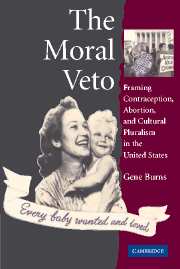Book contents
- Frontmatter
- Contents
- Acknowledgments
- 1 Introduction
- 2 Framing Contraception within Moral Worldviews: The Early, Radical Birth Control Movement
- 3 The Mainstreaming of Birth Control: A New Alliance with Eugenics and Medicine
- Dennett's Moral Worldview and the Catholic Moral Veto: Unsuccessful Frames for Contraception
- 5 Abortion before Controversy: Quiet Reform within a Medical, Humanitarian Frame
- 6 Abortion and Legislative Stalemate: The Weakness and Strength of the Medical, Humanitarian Frame
- 7 Looking Back: Limiting Frames, Moral Vetoes, and Cultural Pluralism
- Works Cited
- Index
Dennett's Moral Worldview and the Catholic Moral Veto: Unsuccessful Frames for Contraception
Published online by Cambridge University Press: 21 July 2009
- Frontmatter
- Contents
- Acknowledgments
- 1 Introduction
- 2 Framing Contraception within Moral Worldviews: The Early, Radical Birth Control Movement
- 3 The Mainstreaming of Birth Control: A New Alliance with Eugenics and Medicine
- Dennett's Moral Worldview and the Catholic Moral Veto: Unsuccessful Frames for Contraception
- 5 Abortion before Controversy: Quiet Reform within a Medical, Humanitarian Frame
- 6 Abortion and Legislative Stalemate: The Weakness and Strength of the Medical, Humanitarian Frame
- 7 Looking Back: Limiting Frames, Moral Vetoes, and Cultural Pluralism
- Works Cited
- Index
Summary
Introduction
Mary Ware Dennett (1872–1947), generally described as Margaret Sanger's chief rival for leadership of the birth control movement, had many of the qualities Sanger's critics have found lacking in Sanger: Dennett never abandoned her commitment to a broad-ranging social justice agenda, and Dennett never accepted that physicians, rather than women themselves, should have control over access to contraception. She framed contraception as a social justice cause in the interest of a democratic, egalitarian society that respected the right of free speech. An admirer of Dennett would say that, unlike Sanger, Dennett never sold out. And yet Dennett, despite persistent efforts, never really came very close to dominating the framing of contraception. A critic of Dennett, then, would say that she was ineffective.
The hierarchy of the Roman Catholic Church, on the other hand, is often credited with too much success in opposing Sanger. Sanger herself saw Catholic opposition as a monolith, and Catholic resistance is often enough portrayed as the chief obstacle in the path toward legal, accessible contraception. But, contrary to many analyses, this Catholic opposition does not, on its face, appear to have been particularly successful. In general, Catholic social and political influence in this country grew as the twentieth century progressed; nevertheless, acceptance of contraception also grew during the same period. So contraception seems to be one issue over which Catholic influence was of questionable effectiveness. I argue below that the apparent success of Catholic opposition was, first, less than it seemed.
- Type
- Chapter
- Information
- The Moral VetoFraming Contraception, Abortion, and Cultural Pluralism in the United States, pp. 106 - 149Publisher: Cambridge University PressPrint publication year: 2005



